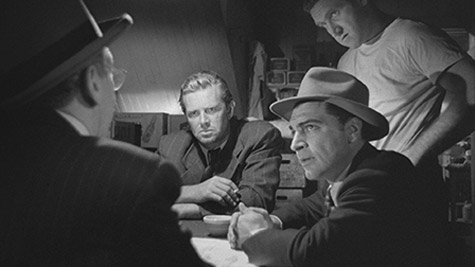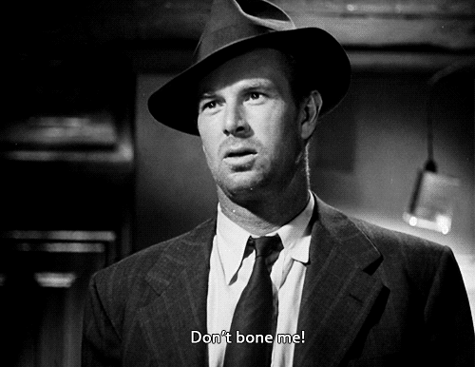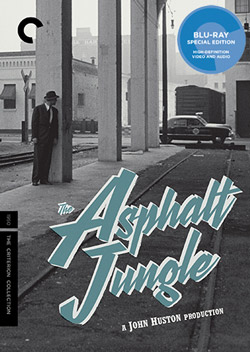
Criterion Collection’s new Blu-Ray edition of the 1950 film noir title The Asphalt Jungle gives me a prompt to write about what I (and many others) consider to be one of the greatest crime/suspense movies ever made. And yet, I feel a little at a loss as to how to approach this piece. I mean, where do I begin?
I guess I’ll just start by running through some of the most notable aspects of the movie. First, it was directed by one of the best to ever orchestrate a motion picture: John Huston. His 11th directorial effort, Huston is the creative mastermind behind other film noir works, notably The Maltese Falcon (1941) and Fat City (1972). While those two are classics of the genre, the case can be made that The Asphalt Jungle is Huston’s defining stroke within this style of movie-making.
Then, there’s Sterling Hayden—one of the lead actors. Hayden is in command of his part in this title, convincingly portraying an irritable, no-nonsense criminal who gets pulled in as the muscle on a big jewelry theft scheme. Like Huston, Hayden is a Hall of Fame-level big screen figure and a prominent figure in this lasting kind of cinematic fare, with important roles in cinematic gems such as Johnny Guitar (1951), The Killing (1956), and Dr. Strangelove (1964). The Killing—directed by one Stanley Kubrick—is, to my mind, the other greatest-ever heist film, along with The Asphalt Jungle.

And how about Marilyn Monroe? You’ve heard of her, right? Her part in this film is considered to be the starlet’s breakthrough role—the one that launched her film career. Although she’s only on the screen during two scenes, Monroe—close to 24 when the film came out—commands attention and evokes various sensations when she appears. Her role as the sultry young girlfriend of a crooked lawyer who becomes a player in the jewel heist brought her some big-time press at the time. This, along with her appearance in All About Eve (also 1950), was the catalyst that led to her getting a sweet contract from 20th Century Fox, which led to the stardom we all know about.
There are other actors who played major roles in The Asphalt Jungle, and I’ll touch on some of them below. But for now, I want to shine a light on Jean Hagen, who portrays the hard-luck woman Doll (gotta love that character name in a film noir), who is romantically dedicated to Hayden’s character, Dix Handley, even though he’s all but indifferent to her. For all the great acting done in this film by Hayden, Monroe, and others, Hagen’s Doll is the character responsible for some of the most moving scenes in the tale.
Before I give an overview of the full storyline of The Asphalt Jungle, I want to mention that if you’re a noir fiction enthusiast and you haven’t read the 1949 novel by W. R. Burnett (same title) upon which the movie is based, you’ll want to get on that. It’s an under-appreciated classic of the genre, and Huston and co-screenwriter Ben Maddow were extremely faithful to it in their script—in many places to a word-for-word, scene-for-scene extent.
 So, the story of the movie under discussion: in a nameless Midwestern city that could be Cincinnati, the local police commissioner is ready to crack down hard on crime in the area in an effort to give his beleaguered police force a public relations boost and because he loathes having criminals in the terrain over which he is responsible. Meanwhile, a big-time con who goes by the name “Doc” is released from prison and immediately wants to get on to a large-scale robbery that another prisoner outlined for him in the pokey.
So, the story of the movie under discussion: in a nameless Midwestern city that could be Cincinnati, the local police commissioner is ready to crack down hard on crime in the area in an effort to give his beleaguered police force a public relations boost and because he loathes having criminals in the terrain over which he is responsible. Meanwhile, a big-time con who goes by the name “Doc” is released from prison and immediately wants to get on to a large-scale robbery that another prisoner outlined for him in the pokey.
Doc (played by Sam Jaffe) wants to hit a high-end jeweler, one with some prized rocks in its stock that hasn’t been taken by crooks for decades. Doc needs a few things to get this tickle going: a safe cracker, a hard man to be bodyguard, and a getaway driver. And he needs some upfront cash. So he goes to a well-connected bookie (played by Marc Lawrence) who works with him to hire the trio (Hayden’s character among them), and they turn to a shady lawyer (Louis Cahern as Alonzo Emmerich) for the funds and to help organize the post-crime process of unloading the goods for a big payday.
There’s a couple problems with Doc’s plan. For one, heists like this always go wrong, right? Any heist, no matter how well devised and no matter how able its perpetrators, usually runs into some bother along the way.
Secondly, this attorney—while he dresses and carries on like a millionaire and can afford to rent a sweet cottage where he hides his sexy lady-friend (Monroe) from his wife who mostly stays bedridden in their luxury home—is actually broke at the moment. Only, he doesn’t admit that to Doc and the bookie. He tells them the heist idea sounds great and sure, yeah, he’s all in. Not only will he find a way to help them with the upfront funds they need, but he will also act as the fence they can sell the hot jewels to after the job. Simplifies things, right? Cutting out the middleman and all, y’know?
Well, Emmerich plans to pull a big one on the thieves and come away with the jewels without paying them anything for them, then flee to some exotic locale abroad, his youthful honey in tow. I’ll let viewers new to the film see for themselves what comes out of his double-cross idea.
I could say a lot more about the story and its actors, but I’m running short on space and I want to comment on the extras that accompany this new Criterion edition of the film. Suffice it to say that Huston’s movie has everything you could want from a noir crime film. There’s suspense that at times approaches being unbearable, edginess, tough dialogue, good movement, memorable hardboiled characters on both sides of the law, a feeling of bleakness throughout, and a touch of the criminal dreamer’s hopefulness … it’s a gem from start to finish. It hooks you in the first scene and just gets more and more compelling as it goes along.
See also: The Five Best Heist Films You've Never Seen
The film also goes beyond what you get in even some of the better works of film noir by way of its psychological complexity and the effort Huston made to not necessarily sympathize with the criminals, but to show them as regular people with understandable life problems and inner conflicts. It's unsurprising the film was nominated for umpteen different awards.
The Criterion extras, then. They include: a brief but interesting audio clip of Huston offering some thoughts on the film; a peculiar 1983 documentary on Hayden, which shows him to have become a cosmic, eccentric, outsider folk-hero type existing on the fringes of society (and reality) by that time; a highly enlightening new interview with noir historian Eddie Muller, in which we learn as much about Burnett as we do Huston and the film; another new interview, this one with cinematographer John Bailey, who discusses Huston’s relationship with cinematography and its practitioners and how that part of filmmaking was employed in The Asphalt Jungle via the work of director of photography Harold Rosson; a 1979 interview with Huston on the TV show City Lights, during which he discusses his work in films as well as aspects of his personal life; a commentary track with thoughts from film historian Drew Casper; informed booklet notes by critic Geoffrey O’Brien; trailer, etc.
It’s a helluva package of bonus material. I came away from the extras feeling like I could now see several layers into a film I love.
Brian Greene writes short stories, personal essays, and reviews and articles of/on books, music, and film. His work has appeared in 25+ publications since 2008. His pieces on crime fiction have also been published by Noir Originals, Crime Time, Paperback Parade, The Life Sentence, Stark House Press, and Mulholland Books. Brian lives in Durham, North Carolina.
His writing blog can be found at: http://briangreenewriter.blogspot.com. Follow Brian on Twitter @greenes_circles

Ukraine says it has regained control over 3,000 sq km (1,158 sq miles) of territory in a potential breakthrough in the six-month war.